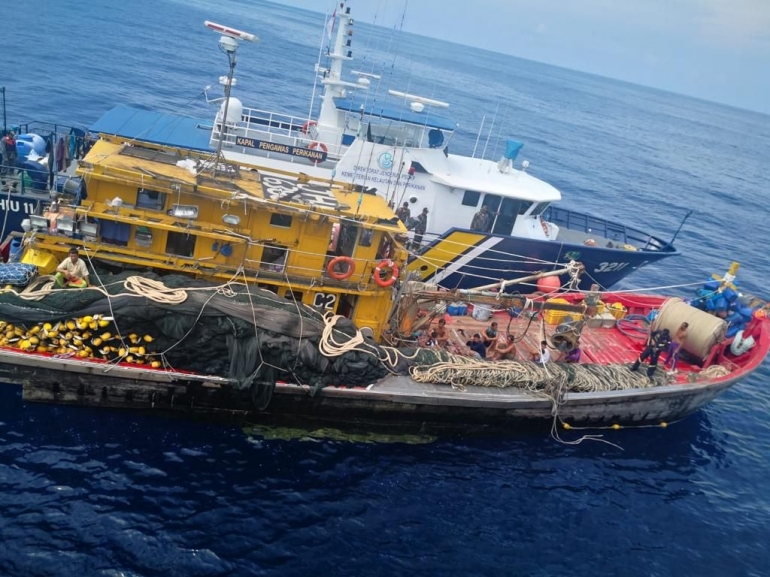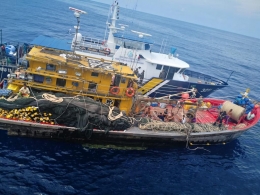Illegal fishing is an illicit activity that is not actually a new crime in the world of marine and fisheries. But maybe for most people this case has just been heard, in the past five years the case of illegal fishing is very intensively discussed.
What is illegal fishing?
Illegal fishing is fishing that is done in violation of a law that has been established in the waters of a country. The definition of illegal fishing usually goes hand in hand with unregulated and unreported fishing, making it difficult for local authorities to monitor exploited resources.
Under the FAO, illegal arrests have caused a total loss of up to 23 billion dollars worldwide, with 30 percent of the losses suffered by Indonesia. According to observers, illegal or unreported fishing occurs in various fishing centers in the world and can reach 30 percent of the total catch. Catches by traditional fishermen generally do not need to be reported because the numbers are relatively small. While fishing by large fishing vessels must register and report the total catch at the local port.
In Indonesia illegal fishing is very common because we know Indonesia is known as the largest Mega-Biodiversity Marine in the world. Many research results reveal that the value of marine wealth in Indonesia turns out to reach trillions of rupiah, a value that is no less great when compared with the results of oil and gas.
However, the potential of Indonesia's seas is disturbed due to the threat of illegal fishing. Illegal fishing can be interpreted as illegal fishing activities or fisheries activities that are carried out contrary to the provisions of the legislation in the field of fisheries.
According to data from the ministry of Marine affairs and fisheries, the state loss due to illegal fishing is estimated at hundreds of trillions each year. Even in the Indonesian context, illegal fishing is often a vehicle for other crimes, such as human smuggling, drug smuggling and slavery.
Illegal fishing is the world enemy
Illegal fishing (illegal, unreported and unregulated fishing) is very serious. IUU fishing is not only an enemy of Indonesia but a global international enemy and all countries agree that this must be eradicated.
The loss due to illegal fishing is not only the loss of hundreds of trillions that should be used for the benefit of the country but also impacts on the destruction of habitat and fisheries ecosystems. illegal fish theft crimes are mostly done by fishing methods that are not environmentally friendly and do not pay attention to the sustainability of the fisheries ecosystem.
in addition to illegal fishing theft also many are accompanied by other crimes such as smuggling, illegal drugs, illegal fuel transactions, human trafficking.
The various effects of illegal fishing theft are what really worries the world, so this has become a common enemy that needs joint handling not only to focus on legal action but also prevention and efforts to repair damage to illegal fishing theft.
Eradication of "Illegal Fishing" Must Be Continued
Seeing the complexity of the problems related to illegal fish theft crimes has become a necessity for the world, especially Indonesia, so that efforts to eradicate illegal fish theft continue to be carried out besides prevention efforts must also be encouraged.
For Indonesia, efforts to eradicate IUU Fishing can improve the competitiveness of Indonesian fishery products in the international fish trade arena. The people of developed countries already have high awareness and reject fishery products obtained from IUU Fishing activities. Developed countries importing global fishery products have also implemented policies to eradicate IUU Fishing through international trade instruments (trade measure), as practiced by the European Union (EU) and the United States (US) as the two major global fish importers.
We take the historical example of the implementation of a trade measure, which is an embargo made by the USA government on shrimp products originating from exporting countries that do not apply the policy of installing Turtle Excluder Devices in trawl nets starting in 1996. The basis of the policy is Article XX letter g The 1994 General Agreement on Tariffs and Trade (GATT) which excludes free trade with the aim of protecting depleted natural resources, in this case the US policy is aimed at protecting the turtle population.
This jurisprudence is then used as a reference for developed countries to require traceability of fishery products through catch certificates to export countries which state that fishery products that are exported are free or not from IUU Fishing.
Fisheries sector oversight
Oversight of marine and fisheries resources plays a strategic role in the implementation of fisheries policies through the operational system of Monitoring, Control, and Surveillance (MCS). Monitoring or continuous data collection has been carried out properly through the application of e-logbooks, placement of observers on fishing vessels and recording of fish landings at ports.
Data obtained from the monitoring process then becomes a consideration for implementing control. Control is carried out through the permit system, the regulation of fishing gear, fishing areas, types of fish that are prohibited from being caught or protected and other technical regulations.
Oversight of marine and fisheries resources serves to oversee compliance of fisheries businesses with the regulations that have been determined. If fisheries supervision is weak, then the technical regulations that have been determined are not implemented properly and can further thwart the achievement of the fisheries policies that have been set.
Fisheries supervision has been carried out properly through the use of fishing vessel monitoring technology (VMS) and satellite imagery to monitor fishing vessels, coordinated implementation of sea and air patrols and supervision of all stages of fishery activities by fisheries supervisors.
The eradication of IUU Fishing with strong fisheries supervision must continue to be carried out to emphasize national sovereignty in managing fisheries resources. The limited space for fish thieves is a protection for fishermen and local fisheries businesses to increase national fisheries production with global competitiveness.
Baca konten-konten menarik Kompasiana langsung dari smartphone kamu. Follow channel WhatsApp Kompasiana sekarang di sini: https://whatsapp.com/channel/0029VaYjYaL4Spk7WflFYJ2H










